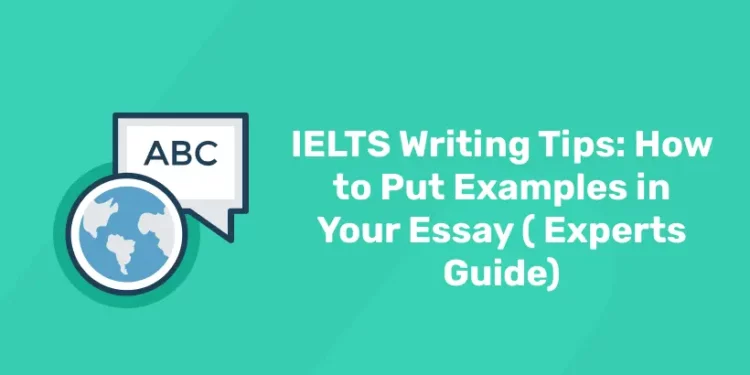Table of Contents
Writing an essay with examples in it will help you score higher on the IELTS writing test. Gaining proficiency in this area is essential for demonstrating your capacity to provide evidence for claims and effectively convey concepts, regardless of your goals for the Academic or General Training modules. This portion requires you to demonstrate your understanding of the task, your responses, and your ability to communicate your thoughts. There is a 60-minute time limit and two jobs that need to be finished in that period. This holds true for the General Test as well as the Academic Test. We will cover important techniques for smoothly incorporating examples into your IELTS essays as well as IELTS writing tips in this comprehensive tutorial.
Crack the IELTS Exam With Online Coaching – Enrol Now!
Introduction
IELTS Writing Task 1 and IELTS Writing Task 2 are the two tasks in the IELTS writing exam. Subjects are broad in scope and can cover a variety of topics. Candidates starting undergraduate and graduate programs, as well as those looking for work or a PR in an English-speaking nation, will find these topics appropriate.
Of the entire test, the writing component of the IELTS is the most difficult. The IELTS Writing Tasks 1 and 2 include of two tasks. You should be aware that the essay questions on the academic and general training assessments are somewhat similar before we get into the specifics. Though it is insignificant, there can be a difference in complexity. The IELTS Writing Task 1 is where there is a distinction. Students pursuing undergraduate and graduate degrees can find themes appropriate for both IELTS Academic writing tasks 1 and 2.
IELTS Writing Task 1: Academic Writing
Time Duration: 20 minutes
Word Limit: 150 words
When completing the first Academic Writing Task on the IELTS, students are expected to describe, summarise, or explain a method, table, chart, graph, or other piece of information in their own words. They might be required to define and clarify facts, outline the steps in a procedure, explain how something operates, or characterise an item or occasion. The primary objective of this activity is to evaluate a student’s ability to comprehend material and express it in his own words.
The first task in the IELTS General Writing module requires candidates to produce an informal, semi-formal, or formal letter. It should be noted that candidates must write at least 150 words. Candidates who write fewer than 150 words will be penalised. However, there won’t be any consequences if you write more than 150 words.
IELTS Writing Task 2: Discursive Essay
Time Duration: 40 minutes
Word Limit: 250 words
A “Discursive Essay” is required for IELTS Writing Task 2. This indicates that a specific topic will be the focus of the essay, and you will be expected to discuss it, offer solutions, make arguments for and against it, and so forth. Since there are no right or incorrect answers in this exercise, the student’s perspective should ideally be neutral. Instead, the emphasis should be on using proper writing style and presenting logical ideas. Ensure that you address the question posed and do not stray from the subject matter. Your essay shouldn’t be tough for the examiner to understand.
It is required of candidates to submit 250 words or more. If you write less than 250 words, you will be penalised. Attempt to make a statement right from the start. The focus of the next paragraphs ought to be on responding to the query and defending your position. You can bolster your argument using facts and examples.
What is an Essay Writing of IELTS Exam
1: Most university students ........................ on campus in their first year.
You must write an essay that satisfies every need in the band 8 writing assessment criteria in order to receive a band 8 on IELTS Writing Task 2. Writing for the IELTS is not that difficult if you are able to arrange your ideas into coherent, grammatically sound phrases and have a solid comprehension of the test pattern. IDP created IELTS Prepare to make it simple for you to access a variety of practice materials, including articles, videos, practice exams, and example answers.
How to write an essay?
Since writing is the focus of this entire IELTS part, it is preferable to ask this question right away! Do you know how an essay should be written and can you express yourself clearly and succinctly? Here’s a short guide:
- Introduction: Properly introduce the subject or prompt. Proceed directly to the body paragraphs and do not take the time to make your introduction seem perfect.
- Body Paragraphs 1 and 2: These paragraphs will assist you in clearly decomposing your thoughts. You must support your arguments with solid, pertinent examples. Generally speaking, it’s best to limit your ideas to one paragraph. Recall that you must make a smooth, logical transition from one paragraph to the next. Verify that they are connected rationally and correctly.
- Conclusion – You can achieve great things with a strong ending. It is very important for Task 2. Condense your arguments and support the ideas you made in the body paragraphs. Revisit the prompt and bolster your response.
Crack IELTS Exam With Online Coaching – Enrol Now!
Ace Your IELTS Exam with Confidence!
Unlock your potential with our expert-led IELTS preparation course. Achieve your dream score and open doors to global opportunities!
Start Your IELTS Journey Today!Tips for including examples in the Essay
By using these pointers, you can successfully use examples in your essay to support your claims and give your work more clarity and substance. Always pick instances that are pertinent, precise, and diverse; consider their analysis and interpretation; and make a smooth transition from them to your primary ideas.
Choose Relevant Examples:
Select examples that directly support or illustrate the points you are making in your essay. Ensure that the examples are relevant to the topic and help to clarify or strengthen your arguments.
Provide Specific Details:
When including examples, provide specific details such as names, dates, statistics, or real-life scenarios to make your examples more compelling and persuasive. Specific details add credibility and depth to your arguments.
Use Varied Examples:
Incorporate a variety of examples to demonstrate a range of perspectives or scenarios related to the topic. Using diverse examples can help to enrich your essay and provide a more comprehensive analysis of the issue at hand.
Analyze and Interpret Examples:
After presenting an example, take the time to analyze and interpret its significance in relation to your argument. Explain how the example supports your thesis or sheds light on the topic, and discuss its implications or relevance.
Provide Context:
Offer context for your examples to help readers understand their significance. Briefly explain the background or circumstances surrounding the example to ensure that readers can fully grasp its relevance to your argument.
Balance Quantity and Quality:
While examples can strengthen your arguments, it’s essential to strike a balance between the quantity and quality of examples. Avoid overwhelming your essay with too many examples, as this can detract from the coherence and focus of your arguments.
Connect Examples to Main Points:
Ensure that each example you include directly relates to the main points or themes of your essay. Clearly articulate how each example supports your thesis statement or contributes to the overall argumentative structure of your essay.
Use Transitional Phrases:
Introduce examples using transitional phrases such as “for example,” “to illustrate,” “in particular,” or “specifically.” These phrases signal to readers that you are providing an example to support your argument and help to smoothly integrate examples into your essay.
Entri App is a great platform to learn IELTS online because there are a lot of aspirants-friendly methods there including tests, study plans, and recorded video classes all created by experienced faculties. This makes sure that users are aware of any updates to the IELTS exam format. Achieve an impressive 8+ band score in IELTS Within 40 Days. Grab expert guidance, practice sessions, and LSWRA mock tests.
With over 100 study materials, sample notes, live, one-on-one, and group interactive sessions with our professional mentor, recorded sessions, weekly assessments, and remote learning options, our course provides IELTS candidates with a unique and affordable learning experience.
Courses Offered
Take our academic version of the IELTS if you want to study overseas. Alternatively, our general IELTS course is ideal if you’re looking for a job or permanent residence.
- General IELTS
- Academic IELTS
Course Overview
- 30 Days Mentorship
- Exam Packs :Reading Practice
- PDF Course materials
- 6 Months Recorded Videos Validity
- Live Exams and Special Exams
- Recorded Video Classes on App
- Guidance & Recorded Videos for IELTS: Receive Mentorship
Crack IELTS Exam With Online Coaching – Enrol Now!
| Related Article | |
| Tips for Writing High-Scoring IELTS Essays | Tips to write an IELTS Semi-Formal Letter |
| Top IELTS Reading Topics | Top IELTS Writing Topics |
Ace Your IELTS Exam with Confidence!
Unlock your potential with our expert-led IELTS preparation course. Achieve your dream score and open doors to global opportunities!
Start Your IELTS Journey Today!Frequently Asked Questions
What are the 3 essay types in IELTS writing?
Recognise what to expect so that you are ready for any essay on the IELTS exam. Your strategy must be appropriate for the type of essay you are writing, whether it is a descriptive, opinion, or comparison essay. We examine potential question types and appropriate responses in this lesson.
How many essays do you write in IELTS?
IELTS essays come in five different varieties. Essay kinds include discussion and opinion-based essays, essays that are agreeable or disagreeable, essays that compare and contrast, essays that address problems and offer solutions, and essays that weigh benefits and drawbacks.
What are the requirements for IELTS essay?
The essay has to be broken up into multiple paragraphs. Make sure your essay for Task 2 is divided into at least 4 or 5 paragraphs. An essay always consists of two paragraphs: an introduction and a conclusion. The essay’s body, which needs to be broken up into two or three paragraphs, then begins.








![How to choose a right accounting career path for you [Expert's Guide]](https://entri.app/blog/wp-content/uploads/2024/03/How-to-choose-a-right-accounting-career-path-for-you-75x75.png)
